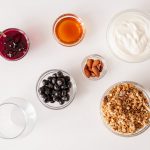Replacing red meat with other protein sources may prevent heart disease, death
Scientists from Soochow University found that replacing red meat with other protein sources may prevent heart disease and early death.
Plant-based diets may benefit long-term health, study finds
Scientists from the University of Oxford found that plant-based diets may benefit long-term health.
Healthy diets could help protect your health from air pollution
Scientists from Peking University and elsewhere found that eating healthy diets may protect health from air pollution.
Plant-based meats may not be as healthy as we thought
Plant-based meat products had a higher health star rating, lower saturated fat, and lower sodium content, but higher sugar content.
Higher intake of dairy foods linked to higher prostate cancer risk
Scientists from Loma Linda University and elsewhere found that a higher intake of dairy foods is linked to higher prostate cancer risk.
Vitamin B12 deficiency may increase risk of Alzheimer’s Disease
Scientists from Saarland University found that vitamin B12 deficiency may increase the risk of Alzheimer's Disease.
Dietary fiber intake linked to lower risk of migraine headache
Scientists found that increased dietary fiber intake is linked to a decreased incidence of migraine.
Low-carb diet may reduce blood sugar in prediabetes
Scientists found that a low-carb diet can help people with unmedicated diabetes, and those at risk for diabetes, lower their blood sugar.
A healthy lifestyle may slow down memory decline
Scientists found a healthy lifestyle, in particular a healthy diet, is associated with slower memory decline in older people.
Vitamin D deficiency linked to miscarriage, study finds
Scientists from the University of Birmingham and elsewhere found that vitamin D deficiency is linked to a higher risk of miscarriage.










